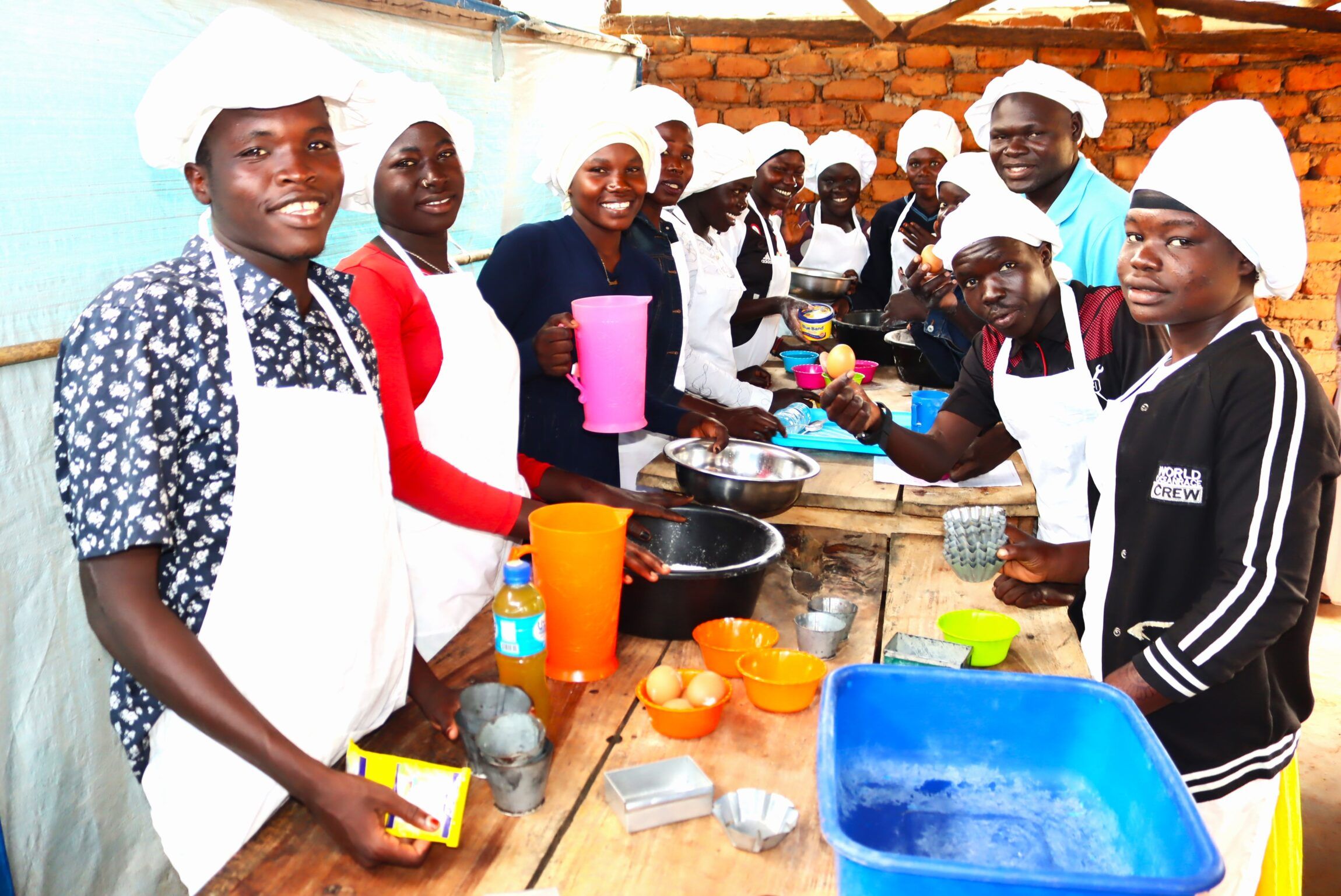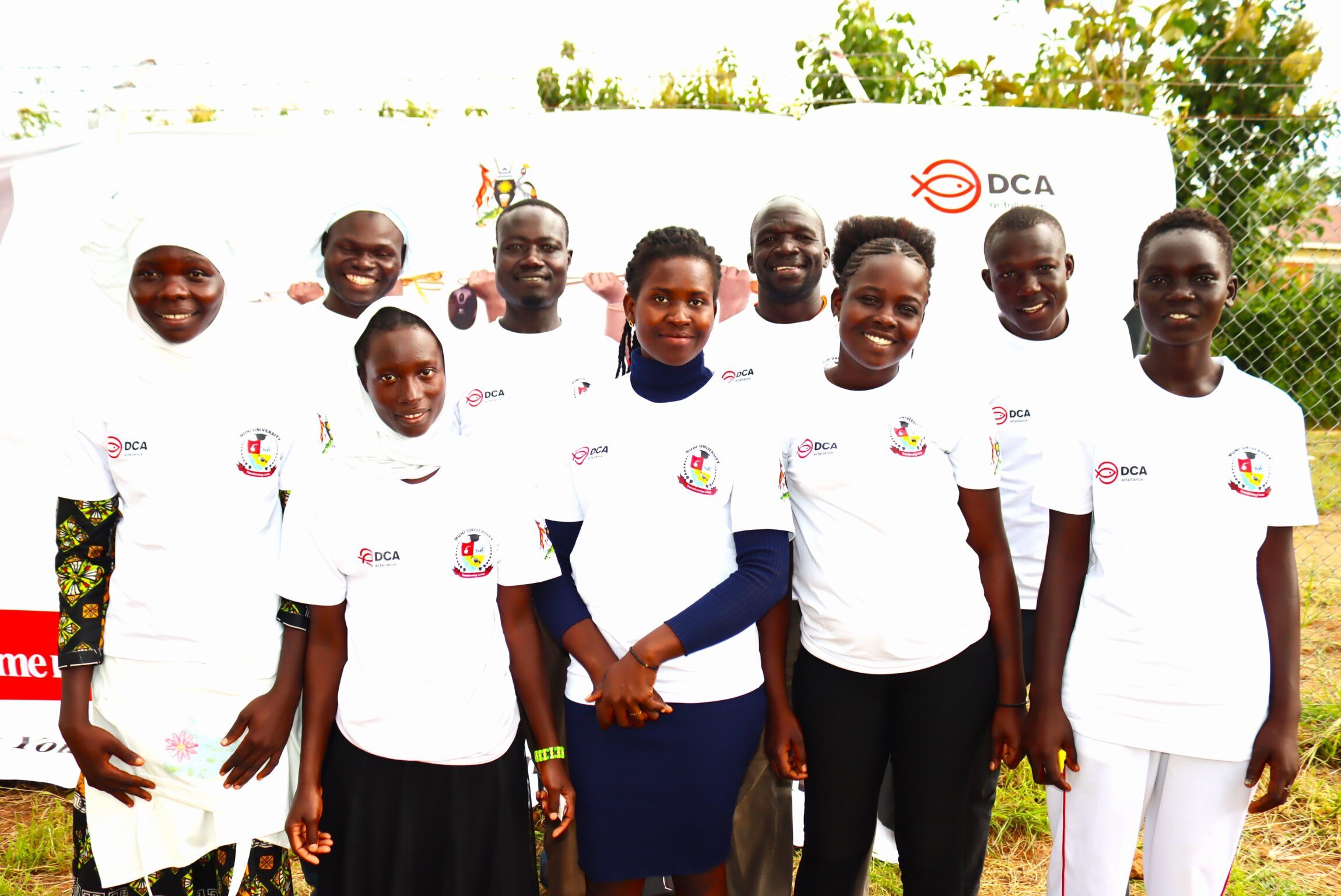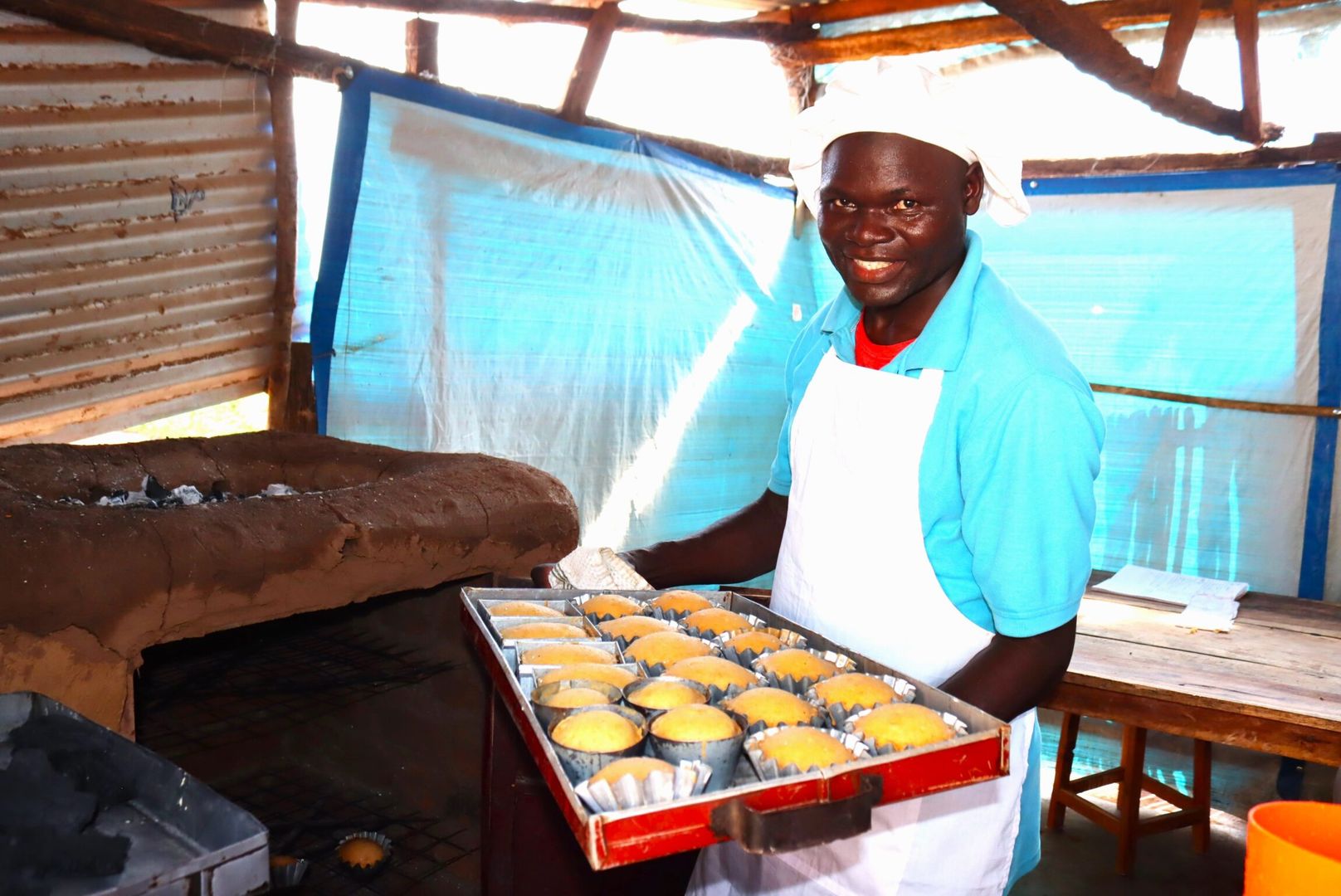Defying gender norms and creating a path to success in Yumbe District, West Nile Region.
Omwana Waladi, a 32-year-old resident of Yumbe Town Council, is redefining what it means to pursue one’s dreams in a community where societal norms often dictate one’s path. Initially hesitant to enter the catering field, Waladi struggled with the stigma that catering is a “woman’s job.” However, through determination and the innovative training provided at Taha Training Center, he has embraced his new career and is now not only thriving but also inspiring others to break free from societal expectations.
“Before I joined the training, I used to fear being trained in catering because of society’s perception. But these days, I have become empowered and courageous, which is why I embraced the opportunity that DCA gave us to gain innovative skills that will enable us to earn a living.” Waladi reflects on his journey
Youth Unemployment in Uganda’s Refugee-Hosting Regions
Uganda, home to the world’s youngest population and the largest refugee-hosting country in Africa, faces a tough challenge: youth unemployment. With over 1.5 million refugees, 60% of whom are young people, both refugee and host community youth face high poverty and unemployment rates. Barriers such as limited access to quality education, practical skills, and financial resources, coupled with discrimination and prolonged inactivity due to conflict, leave many young people without hope or opportunities.
Empowering Youth through RETI Initiative.

In response to these challenges, DanChurchAid (DCA) launched an ambitious program aimed at empowering 18,000 young people, with a focus on 60% young women and 70% refugees. This project provides market-relevant business and life skills, establishes and digitizes Youth Savings and Loans Associations (YSLAs), links them to financial institutions, and offers business incubation support and innovation grants. The program also emphasizes gender and safeguarding training for stakeholders.
RETI Program’s Impact on Waladi’s Life
The Refugee and Host Community Youth Empowerment and Transformation Initiative (RETI), funded by the Mastercard Foundation and led by a consortium including Muni University, Gulu University, and Bishop Stuart; and six non-university partners, that is, DanChurchAid, Finn Church Aid, Community Empowerment for Rural Development, PALM Corps, Meeting Point Kitgum, and Young African Refugees for Integral Development, has had a profound impact on Waladi’s life.
Before joining the program, Waladi was a school dropout, struggling to make ends meet through subsistence farming. He felt trapped and dependent on others for financial support. However, the training at Taha Training Center offered him a new path.
“In just one and a half months, I have learned how to start up and manage a business, how to talk to customers, and I have gained a lot of knowledge and skills in catering, and I’m making my own money, ” Waladi shares. “Before I joined this project, I was a school dropout who tried practicing farming for survival, but it never worked well for me.”
From Trainee to Entrepreneur
Waladi’s transformation is nothing short of remarkable. With a modest start-up capital of UGX 15,000, which he raised through selling his clothes and shoes, he began baking yellow cakes. His products quickly became popular in Yumbe’s main market, and he now earns a weekly profit of UGX 21,000 from his sales. This income has enabled him to support his family, buy necessities, and even save for future business expansion.
“My life is different from others who remain idle and wait for handouts,” Waladi says with pride.

Despite the challenges of balancing training and business, Waladi remains focused and ambitious. The tools and materials provided by the training center have been crucial in helping him meet the growing demand for his products.
A Vision of Growth and Prosperity
Waladi’s story is far from over. He has big plans for the future, including expanding his business, opening a restaurant in Yumbe, and building a permanent home for his family. He dreams of providing his children with a high-quality education and ensuring a stable future for them.
“I plan on opening a restaurant in Yumbe town and another one in my village,” Waladi reveals. “In my plans, I intend to construct a permanent house for my family because right now, we are sleeping in a grass-thatched house. But when I work hard and make more money, I will build a permanent house.”
The Instructor’s Perspective: A Community Transformed
Iziku Jennifer, the Principal and Catering Instructor at Taha Training Center has seen the transformative power of the RETI program firsthand. With years of experience in youth training, she is passionate about supporting the large youth population in Yumbe.
“I am very grateful for the opportunity provided by DCA to train local youth,” says Jennifer. “Despite minor challenges like attendance issues due to domestic responsibilities, the training is progressing well, with many trainees, including Waladi, already starting their own businesses and contributing to the local economy.”
Jennifer is proud of her students’ progress and is optimistic about their future. “The program has positively impacted the community by providing valuable skills and fostering a strong relationship with locals,” she adds.
The Power of Empowerment
Waladi’s journey from a hesitant trainee to a successful entrepreneur is a testament to the power of empowerment and skill development. By overcoming societal stereotypes and embracing opportunities, he has transformed his life and set an example for others in his community. His story is a reminder that with the right support and determination, anyone can break barriers and achieve success.
ABOUT THE RETI PROGRAM
Muni University in collaboration with eight partners is implementing the Refugee and Host Community Youth Empowerment and Transformation Initiative (RETI) program with funding from the Mastercard Foundation to address unemployment challenges faced by young people aged 15 –35 years in 15 refugee hosting districts in Uganda. The program targets to directly reach 100,000 (60,000 female) and aims to transition 70,000 (42,000 female) young people into dignified and fulfilling work.
Uganda has the world’s youngest population and is also the largest refugee-hosting country in Africa with over 1.5 million refugees, of whom 60% are young people. Both refugee and host community young people face several challenges such as high poverty and unemployment rates attributed to several barriers in finding or creating employment including limited access to quality and market-driven skills, limited access to credit, lack of learning opportunities to develop practical skills, limited business/entrepreneurial skills, lack of industry connections, discrimination, and long periods of inactivity due to conflict and displacement.
RETI is designed to address these barriers and leverage the opportunities identified by employing gender-sensitive and inclusive approaches to programming to empower young people to utilize their potential as agents of change.
This program leverages the friendly policy framework in Uganda by providing educational and job opportunities for refugee and host community youth. This includes providing access to market-relevant vocational training and educational opportunities to help refugee youth access skills needed by the labor market to access self or wage employment. It also provides mentorship and internships, counseling, and mental health and creates networks and forums where refugee youth can come together to share resources and experiences.
RETI adopts a holistic approach to providing market-relevant skills, including addressing learners’ psychosocial and general well-being.
RETI targets 100,000 young people with interventions under three key result areas namely.
1. Increased access to market-relevant training skills and utilization among young women and men.
2. Increased enterprise growth and access to work opportunities among young people
3. Enhanced quality in the delivery of youth-friendly services, market-relevant courses, and innovations.
DCA in this project has a goal to support 18,000 financially disadvantaged young people (60% young female, 70% refugees, 3% youth with special needs) from Yumbe, Terego and Koboko). The project intends to improve access quality, innovative market relevant education skills and to transition them to dignifying and fulfilling work such that they become economically resilient and able to sustain their lives, families, and communities.
RETI is a Gender-responsive and inclusive intervention, and DCA has taken deliberate action by allocating 60% slots for young women, working with Women-led MSMEs, providing childcare facilities, and ensuring that a Safeguarding strategy and young people engagement plan to create a conducive environment for women are in place.
RETI is also aligned to key strategic policy Frameworks including DCA strategic goal 2, TVET Policy, NDP III, Vision 2040, SDG (4,8) and Settlement Transformational agenda II.
Furthermore, DCA makes sure the project integrates digital solutions & Agribusiness, business incubation support & innovation grants to facilitate access into the labor market space.
On the other hand, RETI project contributes to systemic changes such as shifts in policies, positive mindset-change, relationships, and power dynamics
By 2027, the DCA RETI project is expected to have achieved the following key deliverables and results: 18000 young people equipped with market-relevant business and life skills (60% young women and 70% refugees); 500 YSLAs established and digitized; 200 YSLAs linked to financial institutions; 3600 young people provided with business incubation support; 750 young people provided with innovation grants; and Policies developed /reviewed and executed.

